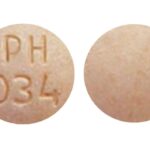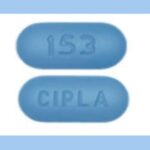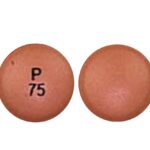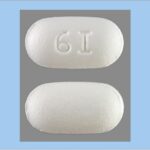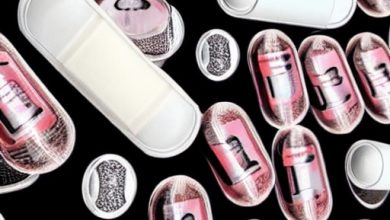Green H 104 Pill: Uses, Dosage, Side Effects, Interactions
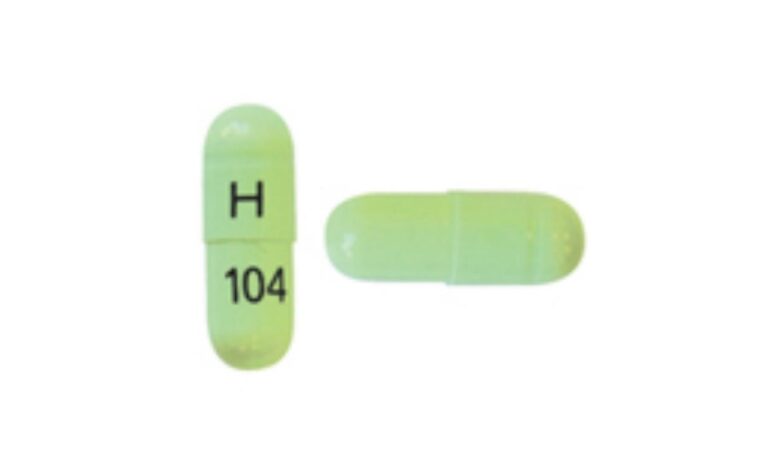
The green, capsule-shaped pill with the imprint H 104 has been identified as Indomethacin 50 mg supplied by Camber Pharmaceuticals, Inc.. Indomethacin is used to relieve moderate to severe pain, tenderness, swelling, and stiffness caused by osteoarthritis (arthritis caused by a breakdown of the lining of the joints), rheumatoid arthritis (arthritis caused by swelling of the lining of the joints), and ankylosing spondylitis (arthritis that mainly affects the spine). Indomethacin is also used to treat pain in the shoulder caused by bursitis (inflammation of a fluid-filled sac in the shoulder joint) and tendinitis (inflammation of the tissue that connects muscle to bone).
Indomethacin immediate-release capsules and suspension (liquid) are also used to treat acute gouty arthritis (attacks of severe joint pain and swelling caused by a build-up of certain substances in the joints). Indomethacin is in a class of medications called NSAIDs. It works by stopping the body’s production of a substance that causes pain, fever, and inflammation.
What should I tell my health care provider before I take this medicine?
They need to know if you have any of these conditions:
• asthma, especially aspirin sensitive asthma
• coronary artery bypass graft (CABG) surgery within the past 2 weeks
• depression
• drink more than 3 alcohol containing drinks a day
• heart disease or circulation problems like heart failure or leg edema (fluid retention)
• high blood pressure
• kidney disease
• liver disease
• Parkinson’s disease
• seizures
• stomach bleeding or ulcers
• an unusual or allergic reaction to indomethacin, aspirin, other NSAIDs, other medicines, foods, dyes, or preservatives
• pregnant or trying to get pregnant
• breast-feeding
How should I use the green H 104 pill?
Take this medicine by mouth with food and with a full glass of water. Follow the directions on the prescription label. Take your medicine at regular intervals. Do not take your medicine more often than directed. Long-term, continuous use may increase the risk of heart attack or stroke.
A special MedGuide will be given to you by the pharmacist with each prescription and refill. Be sure to read this information carefully each time.
Talk to your pediatrician regarding the use of this medicine in children. Special care may be needed. While this drug may be prescribed for children as young as 15 years for selected conditions, precautions do apply.
Elderly patients over 65 years old may have a stronger reaction and need a smaller dose.
Overdosage: If you think you have taken too much of this medicine, contact a poison control center or emergency room at once.
NOTE: This medicine is only for you. Do not share this medicine with others.
What if I miss a dose?
If you miss a dose, take it as soon as you can. If it is almost time for your next dose, take only that dose. Do not take double or extra doses.
What may interact with this medicine?
Do not take this medicine with any of the following medications:
• cidofovir
• diflunisal
• ketorolac
• methotrexate
• pemetrexed
• triamterene
This medicine may also interact with the following medications:
• alcohol
• antacids
• aspirin and aspirin-like medicines
• cyclosporine
• digoxin
• diuretics
• lithium
• medicines for diabetes
• medicines for high blood pressure
• medicines that affect platelets
• medicines that treat or prevent blood clots like warfarin
• NSAIDs, medicines for pain and inflammation, like ibuprofen or naproxen
• probenecid
• steroid medicines like prednisone or cortisone
This list may not describe all possible interactions. Give your health care provider a list of all the medicines, herbs, non-prescription drugs, or dietary supplements you use. Also tell them if you smoke, drink alcohol, or use illegal drugs. Some items may interact with your medicine.
What should I watch for while using this medicine?
Tell your doctor or healthcare provider if your pain does not get better. Talk to your doctor before taking another medicine for pain. Do not treat yourself.
This medicine may cause serious skin reactions. They can happen weeks to months after starting the medicine. Contact your healthcare provider right away if you notice fevers or flu-like symptoms with a rash. The rash may be red or purple and then turn into blisters or peeling of the skin. Or, you might notice a red rash with swelling of the face, lips or lymph nodes in your neck or under your arms.
This medicine does not prevent heart attack or stroke. In fact, this medicine may increase the chance of a heart attack or stroke. The chance may increase with longer use of this medicine and in people who have heart disease. If you take aspirin to prevent heart attack or stroke, talk with your doctor or healthcare provider.
Do not take medicines such as ibuprofen and naproxen with this medicine. Side effects such as stomach upset, nausea, or ulcers may be more likely to occur. Many medicines available without a prescription should not be taken with this medicine.
This medicine can cause ulcers and bleeding in the stomach and intestines at any time during treatment. Do not smoke cigarettes or drink alcohol. These increase irritation to your stomach and can make it more susceptible to damage from this medicine. Ulcers and bleeding can happen without warning symptoms and can cause death.
You may get drowsy or dizzy. Do not drive, use machinery, or do anything that needs mental alertness until you know how this medicine affects you. Do not stand or sit up quickly, especially if you are an older patient. This reduces the risk of dizzy or fainting spells.
This medicine can cause you to bleed more easily. Try to avoid damage to your teeth and gums when you brush or floss your teeth.
What are the side effects of green H 104 pill?
Side effects that you should report to your doctor or health care professional as soon as possible:
• allergic reactions like skin rash, itching or hives, swelling of the face, lips, or tongue
• difficulty breathing or wheezing
• nausea, vomiting
• redness, blistering, peeling, or loosening of the skin, including inside the mouth
• signs and symptoms of bleeding such as bloody or black, tarry stools; red or dark-brown urine; spitting up blood or brown material that looks like coffee grounds; red spots on the skin; unusual bruising or bleeding from the eye, gums, or nose
• signs and symptoms of a blood clot such as changes in vision; chest pain; severe, sudden headache; trouble speaking; sudden numbness or weakness of the face, arm, or leg; trouble walking
• unexplained weight gain or swelling
• unusually weak or tired
• yellowing of eyes or skin
Side effects that usually do not require medical attention (report to your doctor or health care professional if they continue or are bothersome):
• diarrhea
• dizziness
• headache
• heartburn
This list may not describe all possible side effects. Call your doctor for medical advice about side effects. You may report side effects to FDA at 1-800-FDA-1088.
Where should I keep my medicine?
Keep out of the reach of children.
Store at room temperature between 15 and 30 degrees C (59 and 86 degrees F). Keep container tightly closed. Throw away any unused medicine after the expiration date.
NOTE: This sheet is a summary. It may not cover all possible information. If you have questions about this medicine, talk to your doctor, pharmacist, or health care provider.

